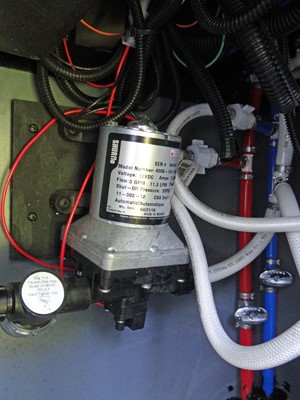By Gary Bunzer, Technical Editor
Most RVs are equipped with a fresh-water demand pump. Very small folding camping trailers or pickup campers might have something different, such as a hand-operated pump. Though RV water pumps are quite reliable, at times the water pump may not perform as expected. Following are a few instances of water pump failure and how to effectively troubleshoot the cause.
If the pump will not run at all, open any two faucets; turn the master pump switch on; and, with a 12-volt test light, pierce the red wire that is attached directly to the pump motor. Attach the negative lead of the test light to a good ground connection. If voltage is present on the wire at the motor, check the ground wire for the pump motor. If that wire is sufficiently grounded, the motor likely is faulty.
If no voltage is indicated on the red wire, touch the test light to both wires attached to the pressure switch. If one is hot, remove them both and touch them together. If the pump runs, the pressure switch is faulty.
Obviously, if no voltage is indicated anywhere at the pump, check that circuit until the reason for the lack of voltage can be determined. If there is no voltage anywhere in the coach, suspect the battery bank or components in the system. If the RV has plenty of 12-volt-DC electricity, check the pump fuse, the master pump switch, and the wires that electrically connect each of these components to the pump.
If you smell what appears to be burning electrical wires, and find the pump is extremely hot to the touch, remove the pump portion from the 12-volt motor and apply 12 volts directly to the motor. If it runs but does not become hot, suspect binding components within the pump assembly. If it continues to get hot, replace the motor.
Intermittent water pump cycling traditionally has been an indicator of a water leak. The leak may be internal to the pump, but in most cases the leak will exist somewhere in the fresh-water system. A faucet may drip, the toilet valve may be passing water into the bowl, a fitting may be seeping, the water heater pressure and temperature (P&T) relief valve may be dripping, or any of a couple of dozen other possibilities may be the cause.
To determine whether the leak is internal to the pump, turn off the pump and disconnect the output water line on the pump. Plug or cap the outlet port directly on the pump. Turn on the pump. If it continues to cycle periodically, the pump has an internal leak and will need to be removed and disassembled for further repair. If the cycling vanishes, the leak is somewhere in the rest of the system, downstream of the pump.
If water is not readily seen pooling anywhere, strongly suspect the toilet. Other than the water pump, the toilet is the only other component that could possibly leak without a telltale wet spot. Do not forget to look outside and underneath the RV as well. If the check valve at the city water inlet is stuck partially open, for instance, the same symptom will result.
Also keep in mind, the faster the pump cycles, the larger the leak. If it only “burps” every five minutes or so, it probably is a very small leak. Large leaks should be easier to spot than small leaks. As each leak is located and repaired, run the test again.
Some demand pumps are noisier than others, but if a pump is extremely noisy, tighten any exposed screws. If the noise continues, remove the pump and bench test it to determine which component may be causing the noise. Separate the pump assembly from the motor itself and apply 12 volts directly to the leads on the motor.
If the pump continues to be noisy, you may need to replace the motor. If the motor runs fine by itself, check the individual pumping mechanism components. Be sure the mounting base attaching screws are not too tight. The rubber mounts should be intact and not compressed too much.
If the pump runs, but the water simply sputters out of each faucet, suspect an air leak on the inlet side of the pump. The nonpressurized connections between the tank and the inlet to the pump are prone to having hose clamps loosen. Tighten all clamps and make sure the hose is not kinked anywhere along its entire length. If an in-line filter or strainer is positioned between the tank and the pump, clean it or replace it, depending on the type. In some cases, the problem may be a faulty motor, but those instances are somewhat rare.
If the only way to prohibit the demand pump from running is to shut off the master switch, suspect a stuck or miswired pressure switch. First make sure all the faucets in the RV are closed and the water heater is filled. Then check the wiring from the master switch to the pressure switch, and finally to the pump motor. The voltage should follow that same path. If the wiring appears correct, chances are the pressure switch is faulty and will have to be replaced.
By following these simple troubleshooting procedures, you should be able to quickly determine whether a condition relates to the demand pump or to something in the rest of the fresh-water system.

